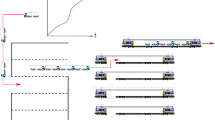Abstract
We consider the control of an infinite capacity shuttle which transports passengers between two terminals. The passengers arrive at each terminal according to a compound Poisson process and the travel time from one terminal to the other is a random variable following an arbitrary distribution. The following control limit policy is considered: dispatch the shuttle at terminali, at the instant that the total number of passengers waiting at terminali reaches or exceeds a predetermined control limitm i . The objective of this paper is to obtain the mean waiting time of an arbitrary passenger at each terminal for given control valuesm 1 andm 2. We also discuss a search procedure to obtain the optimal control values which minimize the total expected cost per unit time under a linear cost structure.
Similar content being viewed by others
References
M.L. Chaudhry and J.G.C. Templeton,A First Course in Bulk Queues (Wiley, New York, 1983).
R.B. Cooper,Introduction to Queueing Theory, 2nd ed. (Elsevier, North-Holland, New York, 1981).
R.K. Deb, Optimal dispatching of a finite capacity shuttle, Management Sci. 24 (1978) 1362–1372.
R.K. Deb and R.F. Serfozo, Optimal control of batch service queues, Adv. Appl. Probab. 5 (1973) 340–361.
R.K. Deb and C.P. Schmidt, Optimal average cost policies for the two-terminal shuttle, Management Sci. 33 (1987) 662–669.
E. Ignall and P. Kolesar, Optimal dispatching of an infinite capacity shuttle: control at a single terminal, Oper. Res. 22 (1974) 1008–1025.
H-S. Lee and M.M. Srinivasan, Control policies for the MxG/1 queueing system, Management Sci. 35 (1989) 708–721.
W.B. Powell, Analysis of vehicle holding and cancellation strategies in bulk arrival, bulk service queues, Transp. Sci. 19 (1985) 352–377.
W.B. Powell, Iterative algorithms for bulk arrivals, bulk service queues with Poisson and non-Poisson arrivals, Transp. Sci. 20 (1986) 65–79.
S.H. Sim and J.G.C. Templeton, Computational procedures for steady state characteristics of unscheduled multi-carrier shuttle systems, Europ. J. Oper. Res. 12 (1983) 190–202.
J. Teghem, Jr., Control of the service process in a queueing system, Europ. J. Oper. Res. 23 (1986) 141–158.
H.J. Weiss, The computation of optimal control limits for a queue with batch services, Management Sci. 25 (1979) 320–328.
H.J. Weiss, Further results on an infinite capacity shuttle with control at a single terminal, Oper. Res. 29 (1981) 1212–1217.
H.J. Weiss and S.R. Pliska, Optimal control of some Markov processes with applications to batch queueing and continuous review inventory systems, The Center for Mathematical Studies in Economics and Management Science, Discussion Paper no. 214, Northwestern University (April 1976).
Author information
Authors and Affiliations
Rights and permissions
About this article
Cite this article
Lee, HS., Srinivasan, M.M. The shuttle dispatch problem with compound Poisson arrivals: Controls at two terminals. Queueing Syst 6, 207–221 (1990). https://doi.org/10.1007/BF02411474
Received:
Revised:
Issue Date:
DOI: https://doi.org/10.1007/BF02411474




